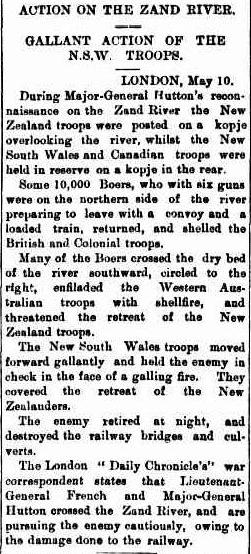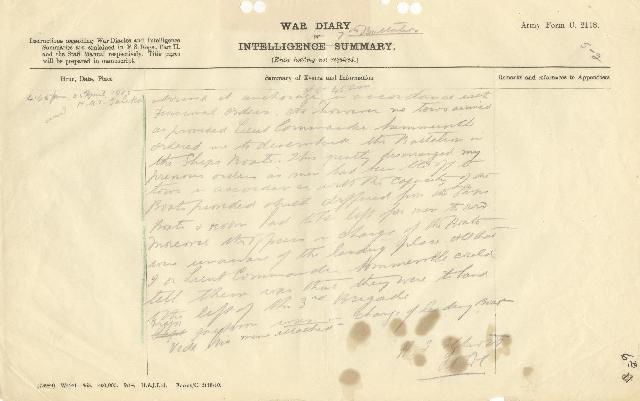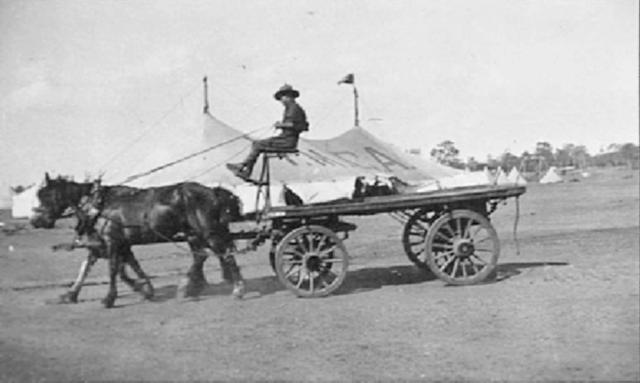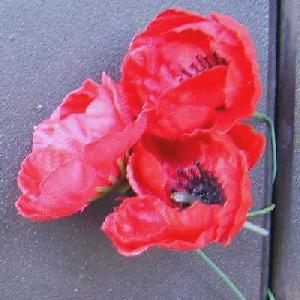Topic: BatzB - Zand River
Zand River
South Africa, 10 May 1900
Outline
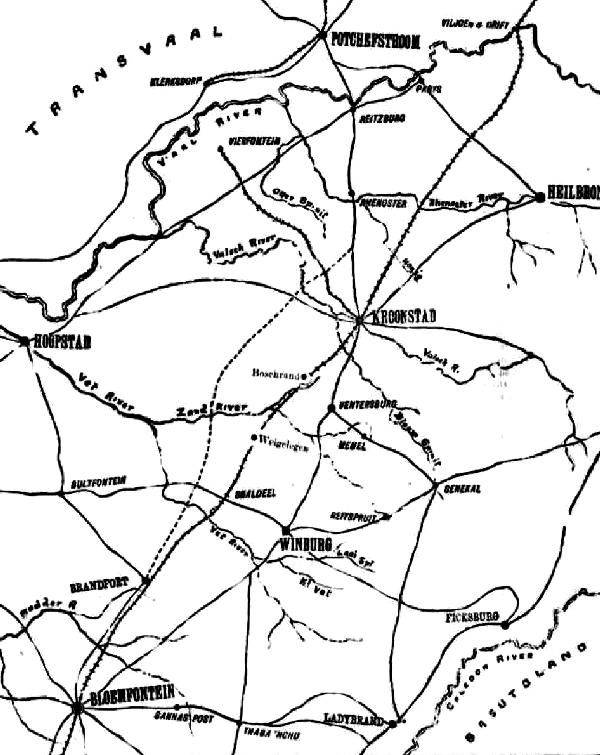
Zand River, an action during the Second South African War, fought on 10 May 1900 in northern Orange Free State as Boer forces attempted to check the advance of the British army led by Field Marshal Lord Roberts. Following the action on 5 May, when the British forced their way over the Vet River (see Coetzee Drift), the Boers had retreated hurriedly to the Zand. It was here that a reconnaissance by the mounted infantry brigade commanded by Major General Edward Hutton (which included several Australian units) found them strongly entrenched around Virginia Siding on 7 May, confirming that this was to be the focus of the burghers' next major show of resistance. A squadron of the New South Wales Mounted Rifles reached within 500 metres of the river, but were driven off by enemy shellfire.
Since the defence on the Vet, the commandant-general of the Boer forces (General Louis Botha) had arrived at Virginia Siding on 7 May to take personal charge of operations, bringing with him some 3,000 reinforcements from the Transvaal. All the Free State burghers still under arms - probably not numbering more than 5,000 - were also now concentrated at the Zand. Their object was to attempt to prevent the capture of Kroonstad, 64 kilometres to the north, which was the Free State capital since the fall of Bloemfontein in March and an important supply centre in its own right. The terrain held a major advantage for this purpose, chiefly in the form of a ridge line running along the river's north bank which formed a useful basis for the defence of the. Boer centre covering the railway line and the left flank in the east. The weak point was the western flank, which was susceptible to a British turning movement, and Botha was obliged to adopt dispositions which took this possibility into account.
Although Roberts recognised the potential for a wide sweep past the Boer flank to carry his cavalry to Kroonstad and beyond, such as he had used to relieve Kimberley (q.v.), he was not prepared to risk the attrition which that tactic had previously caused. The cavalry division, under Lieut.-General John French, had only just been returned to strength in time to rejoin the army for the. Land operation. He nonetheless decided to attempt to envelop Botha's forces by sending two of French's brigades and Hutton's mounted infantry - 4,000 men in all - around the enemy's right flank, meeting up around Ventersburg Siding with another cavalry brigade which was to come in from the east after turning the enemy's left.
Implementation of this plan began on 9 May, when Colonel T.C. Porter's 1st Cavalry Brigade (which included the 1st Australian Horse, the New South Wales Lancers and New South Wales Army Medical Corps) seized control of a ford just west of the furthermost Boer outpost at Diamant Drift, some ten kilometres from the railway. French and his staff, along with Hutton's mounted infantry brigade, joined him here later in the day. The rest of Roberts' army - totalling 38,000 men with 100 field guns and twelve pom-poms - had closed up on the river, but apart from a crossing made at Koolspruit Drift (in the centre) by some mounted infantry the forcing of the Land was left until the following day.
When French set off on 10 May with Porter's brigade, pushing rapidly north-east, Botha was initially unaware that there was any British activity on his flank. Only with the approach of the cavalry towards Vredes Verdrag, a ridge sixteen kilometres directly north and behind him, did he discover the peril confronting the entire Boer defence. After sending off a 200-man reserve to oppose any further progress by French, Botha ordered a general retirement; only a small rearguard was left at Virginia Siding to delay Roberts' main advance.
The measures taken by the Boer commander were just in time. French's efforts to capture Vredes Verdrag and cover the last eight kilometres east to Ventersburg Siding were vigorously opposed, in the first instance by fire from two Boer guns covering the approaches to the ridge. In an attempt to outflank these weapons, the Australian Horse and three other squadrons were sent to seize an apparently unoccupied kopje (low hill) on the left. The troops gained the hill and dismounted, but were then ambushed by a party of Boers who had been lying in wait. Caught in a crossfire and lacking a unified command, the troopers were quickly driven off the hill in confusion. Left behind were fourteen killed and 63 prisoners, 36 of whom were wounded; at least one Australian Horse officer was among those captured.
Attempts by the Boers to capitalise on their success were beaten off, but French -anxious to maintain the momentum of his advance-decided to bypass the enemy position by moving west around Vredes Verdrag and on to the next hill to the north. This movement was constantly harried by the Boers, who were in sufficient strength to keep French's horsemen away from the railway line. Hutton's mounted infantry, following along behind, also encountered some hard fighting. Among the casualties suffered by his brigade were eight men of the New South Wales Mounted Rifles, which regiment had been temporarily assigned to his command.
Meanwhile, Roberts' main column made an easy crossing of the river while his mounted elements in the lead pursued the Boers up the railway to Ventersburg Siding. Although more strongly opposed on the right, the British were again able to drive the Boers back and get across the Land with light casualties. The flanking movement from this side, planned to have been executed by Colonel R.G. Broadwood's cavalry brigade. was late in starting out and played little part in the course of the day's operations, which in effect decided the fate of Kroonstad itself occupied with minimal opposition two days later.
Extracted from the book produced by Chris Coulthard-Clark, Where Australians Fought - The Encyclopaedia of Australia's Battles, Allen and Unwin, Sydney, 1998, pp. 76-78.
Additional References cited by Chris Coulthard-Clark:
L.S. Amery, (ed.) The Times History of the War in South Africa 1899-1902, Vol. 4 (1906), London: Sampson Low, Marston & Co.
History of the War in South Africa 1899- 1902, Vol. 3 (1908), London: Hurst & Blackett.
John Stirling (1907) The Colonials in South Africa, 1899-1902. Edinburgh: W. Blackwood & Sons.
Further Reading:
The Battle of Zand River, South Africa, 10 May 1900
Battles where Australians fought, 1899-1920
Citation: Zand River, South Africa, May 10, 1900, Outline




